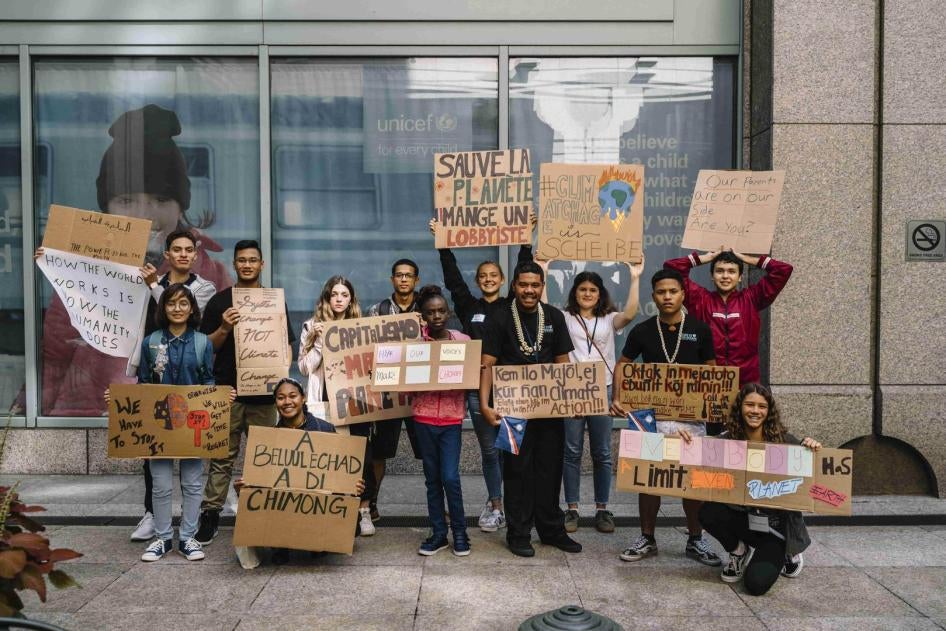A 16-year-old boy named David is one of a group of children lodging a UN complaint against France and four other countries for its lagging efforts to fight the global climate crisis. David is from the Marshall Islands, on the front line of the already visible damage from climate change. Exceptionally high tides—called king tides—and storms regularly cause floods and have caused havoc to the two businesses David’s family owns, a shipping dock and a restaurant. His family is considering leaving the country because of the threat from rising sea levels and increasing mosquito-borne illness. David knows because he was sick from one, but he doesn’t want to leave his beloved country.
This month the world celebrates the 30th anniversary of the UN Convention on the Rights of the Child, the legal commitment by most of the world’s countries to protect children’s rights. But for David and the other children lodging the complaint, there is little to celebrate. “World leaders have failed to keep what they promised,” the 16-year-old climate activist Greta Thunberg says.
On September 23, Thunberg, David, and 13 other young activists from all continents brought a complaint to the UN Committee on the Rights of the Child (CRC), the UN body tasked with monitoring how governments fulfil their obligations to protect child rights. Their message is clear: climate change is already affecting children all over the world, and governments are falling short on decisive and ambitious action to stop it.
The youth activists’ complaint accuses five countries—Argentina, Brazil, France, Germany, and Turkey—of failing to prevent foreseeable human rights harm caused by climate change, and thus placing the burden and cost of climate change on children and future generations. The five countries are the top greenhouse gas emitters among the 44 countries that have accepted the UN Committee’s jurisdiction to hear individual child rights complaints against them. None is reducing carbon emissions enough to keep global temperature rises under 1.5°C.
President Emmanuel Macron has responded by defending France’s image as a champion of climate action and arguing that youth climate activists should focus on countries that block emission reduction efforts. Yet, in June, France’s independent High Council for the Climate reported that France is not on track to meet its 40 percent emissions reductions target for 2030, and will not meet its carbon neutrality target for 2050 without policy changes. Macron had previously invited protest and said climate activists should challenge governments. But French authorities used teargas against climate activists at a protest in September,
The petitioners come from Argentina, Brazil, France, Germany, India, Nigeria, Palau, South Africa, Tunisia, and the US as well as Sweden and the Marshall islands. The complaint and its 333-page appendix detail how they have been exposed to life-threatening dangers attributed to climate change: extreme heat, wildfires, drought, dangerous air quality, storms and flooding, and sea-level rise, as well as increased mosquito-borne illnesses.
Our own research confirms that climate change has a wide range of harmful consequences for child rights. In Turkana, Kenya, for example, we found that climate change has meant even more limited access to food and clean water for local Indigenous communities. Girls walk long distances to find water, exposing them to dangers and keeping them from school and other activities.
Flooding, cyclones and river erosion are more likely to occur with climate change, and in Bangladesh, we found that some families were more likely to arrange marriages for their underage daughters after losing homes or land to such disasters. In Mozambique, about 1 million children needed urgent humanitarian assistance after Cyclone Idai hit in March. Some local community leaders forced women to trade sex for food assistance.
Governments have an obligation to prevent foreseeable human rights harm caused by climate change, including by reducing greenhouse gas emissions. The children argue that Argentina, Brazil, France, Germany, and Turkey have knowingly perpetuated the climate crisis, violating their rights outlined in the Convention on the Rights of the Child.
The complaint is also important because it gives children a voice—“Fridays for Future” has reached the corridors of the UN. The most famous complainant is of course Thunberg herself, who triggered the youth movement by starting a school strike over climate issues, demonstrating alone in front of the Swedish parliament in August 2018. Most of the other child petitioners are environmental activists, too, including Ridhima Pandey, an 11-year-old girl in India who sued her government over climate change.
The children urge the UN body to recognize climate change as a children’s rights crisis and to find that the five target governments have violated children’s rights by “recklessly perpetuating life-threatening climate change.” They also call upon the Committee on the Rights of the Child to recommend that the five governments accelerate efforts to reduce greenhouse gas emissions and assist affected countries “to the maximum extent of available resources and on the basis of the best available scientific evidence” to prevent further harm for children and future generations.
In the coming weeks, the CRC will decide whether the complaint is admissible. It can only be hoped that the committee will allow the complaint to proceed. Today’s young environmental activists deserve to be heard – and answered.










